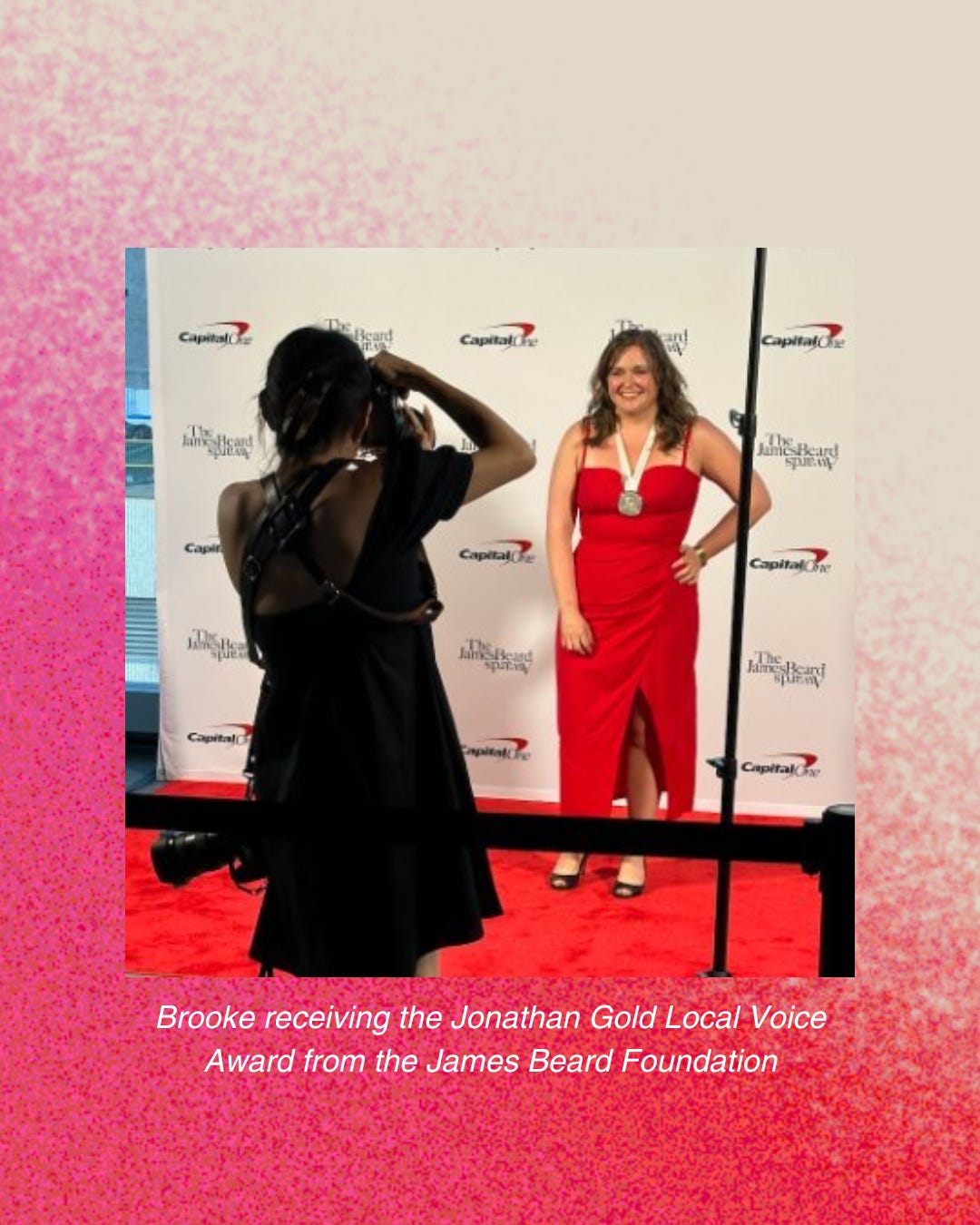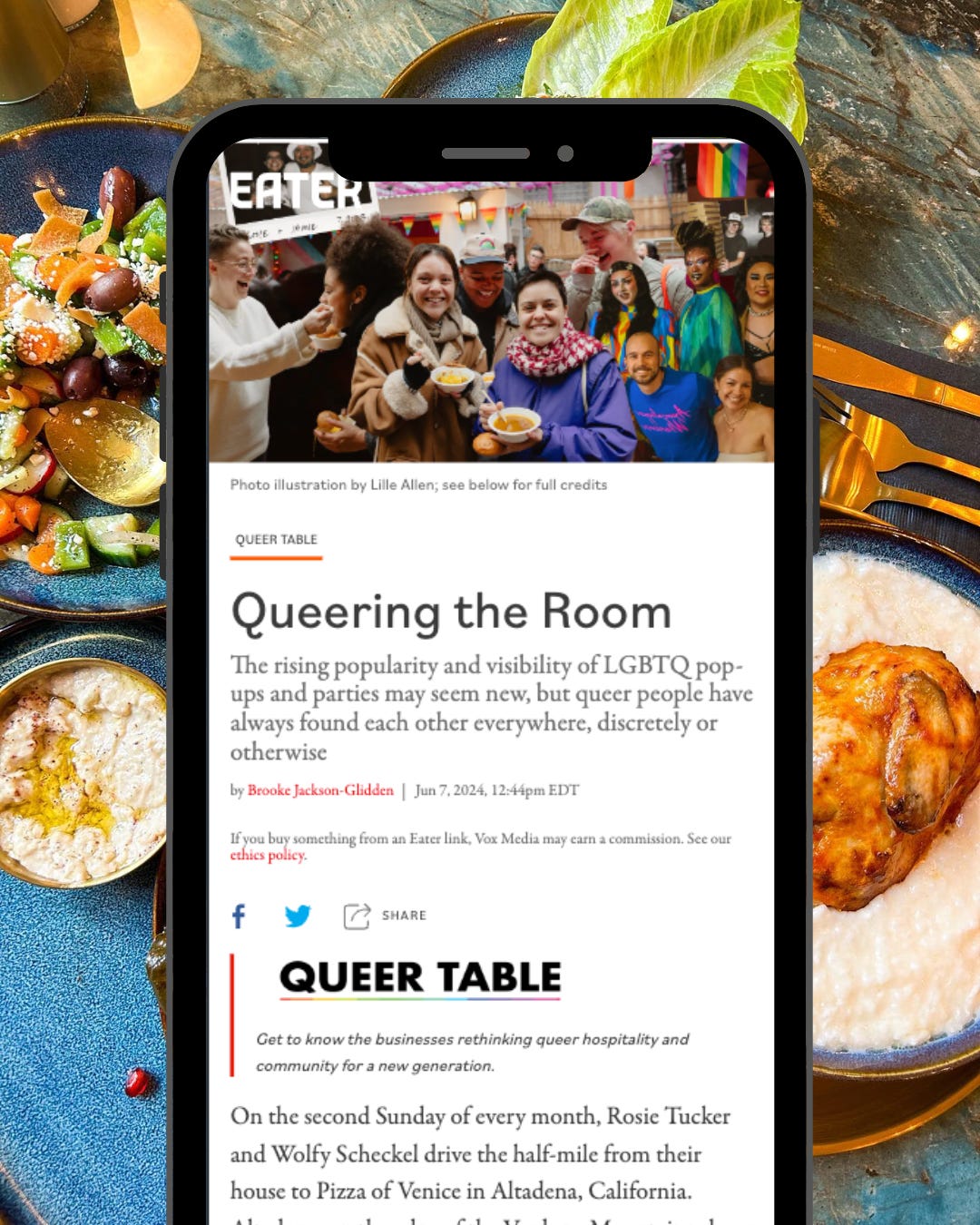THE PLEASURE OF CREATIVE CODEPENDENCY WITH BROOKE JACKSON-GLIDDEN
The James Beard Award-winning editor-in-chief just can't quit writing, and for that we're blessed ☁️
Thanks for supporting SPACIES, and in turn the artists we feature each week. Our content will always remain free — if this post inspired you, consider giving us an energetic hat tip by becoming an official free subscriber.
Brooke Jackson-Glidden is the James Beard Award-winning editor-in-chief of Portland Monthly, a professor of food journalism at Linfield University, and the mother of two neurodivergent cats.
BROOKE’S DIVERGENT CREATIVE STRATEGIES: ACTION/INACTION
What if the grind was kinda fun? A “good” creative process doesn’t necessarily mean an easy, frictionless, speed bump-free experience. Don’t worry if you’re wrasslin’ with your work a bit — there’s something satisfying in getting through it when it “gives you shit.”
Just worry about the next immediate thing. There’s no point in kvetching over the 1839th step if you’re only on step number two. Worry about getting through what’s directly in front of you. The future has a way of sorting itself out.
Make an emotional support copy of your work before you shred it to edit. From a practical perspective, it’s nice to have a side-by-side comparison of how something you’re working on evolved. From the less logical emotional side, you’ll be less fearful of killing your darlings if you know you can resurrect said darlings if you want.
What’s your metaphorical Adderall — something that slingshots you into an inspired creative tornado of action?
Well, other than literal Adderall (or, these days, Vyvanse), I find myself most inspired after time in nature. Not to be a stereotypical Oregonian, but I notice that if I let myself sit next to a lake for a few days, nap in a kayak while floating down a river, or snowshoe up a mountain, I’ll come back to my desk with 14 story ideas.
There’s a sweet little trail along a creek within Forest Park, just a few minutes from my apartment in Portland; sometimes, I’ll go through periods of hiking there every morning before work, identifying the mushrooms and wild herbs and berries and letting myself soak up the electric green of that place. Some of my favorite pieces were born on that trail.
What idea or concept are you chewing on? Has it shown up in your work yet?
I don’t want to show my hand, and genuinely I have too many projects I’m currently working on to identify a single idea. To keep things vague, I’ve been thinking about the idea of a “last meal” — what people choose to eat if they have the opportunity to choose.
I spoke to a death doula for a story; she told me about a woman receiving end-of-life care who asked her friends to make a big meal at her home on the day she died. She couldn’t eat solid food anymore, but she wanted to smell it and hear her friends in her kitchen when she drifted away. I think that’s beautiful. Please don’t steal my idea, universe!!
How particular are you about your notebooks? Pens? What do you write in and with?
For professional writing — interviews — I use a classic reporter’s notebook, and really won’t settle for anything else unless I’m really in a pinch.
For personal writing, I use this beautiful embossed leather-bound journal cover from Jenni Bick; it’s great, because you can replace the journal inside. I probably have 10 of those used journal refills in a box in my closet. I am not particularly picky with pens, partially because I can’t afford to be — I lose pens so constantly.
What was going through your mind when you first decided to share your work?
If I’m being honest, I’m not sure I ever really *decided* to share my work. I knew I wanted to write when I was six, and never really thought, “Hm, maybe keep this to yourself.”
I was such an insufferable young writer. In middle school, I would read poems I wrote in my sixth grade Geography class. My teacher was so encouraging; he took me to my first poetry slam when I was 12. But God, I feel so bad for anyone else in that class who had to patiently sit through all my fucking poems.
What’s your media diet, at present?
Not to be a company shill, but I do read a lot of Eater stories. I’m lucky to work alongside so many people who inspire me every day. For professional reasons, I read the other local publications — the Oregonian, Willamette Week, the Portland Mercury, Portland Monthly, and the Portland Business Journal — and I listen to OPB, our local NPR affiliate. I am a regular Bon Appetit and Taste reader, of course, and when I can, I like to read the food sections of the heavy hitters (the San Francisco Chronicle, the LA Times, the New York Times, the Washington Post). And I’ve been a New Yorker subscriber for as long as I can remember (digital, now, because I’m poor).
But expanding outside the world of print journalism, I listen to a ton of podcasts — Maintenance Phase, If Books Could Kill, and You’re Wrong About are my big three, though I dabble in things like Las Culturistas and Decoder Ring. I’m between books right now; I just finished The Hundred Years' War on Palestine by Rashid Khalidi, and I’m looking for something a little lighter.
In terms of music, Fiona Apple and boygenius (individually or as a trio) are in regular rotation, though my boyfriend has also infected me with a passion for Dutch rap, which is a) very embarrassing and b) often playing in my car.
Not a ton of TV right now (I’m watching Six Feet Under and marveling at how frequently people use gay slurs. What is this, the Sopranos?), but my friends and I frequent the Hollywood Theatre in Portland, which regularly screens old movies on 70 or 35 mm. I recently saw Female Trouble there, and I’m heading to Tampopo there this weekend.
To be creative and to make things in 2024 is objectively difficult. You have to square off with distractions, global anarchy, and perpetual haunting of the existential question: “why bother?” What keeps you coming back to the ring?
Something my old teacher, David Carr, used to say is that writing sucks because your editor gives you shit, your sources give you shit, you type and type and type and type, your editor gives you more shit, you revise and revise and revise, it finally runs, then commenters give you shit and the source gives you shit and maybe your editor gives you more shit, and then you do it all again. “But hey,” he’d say, “it beats working.”
I don’t think I could really do anything else. I come back to this again and again. Over the course of my career, I’ve applied for jobs at nonprofits, or considered going back to school; I always chicken out, because I cannot imagine doing something else with my day every day. And when I take time away from this job, I end up writing on my own anyway. I get back in the ring because I have a very codependent relationship with writing, I guess. That’s not a good answer, is it?
Something my old teacher, David Carr, used to say is that writing sucks because your editor gives you shit, your sources give you shit, you type and type and type and type, your editor gives you more shit, you revise and revise and revise, it finally runs, then commenters give you shit and the source gives you shit and maybe your editor gives you more shit, and then you do it all again. “But hey,” he’d say, “it beats working.”
John Cage was inspired to develop his practice of composing via random chance and chaos after reading a book about the Chinese divining practice, The I-Ching. What influences or inspiration from outside of your field or profession have made the biggest impact on your work or process?
My dad was a reforestation tree planter for a decade, which meant he spent a lot of his time hauling tree saplings on his back up and down mountains throughout the Pacific Northwest. Tree planters are often paid per tree; to make enough money to live, you have to plant a lot of trees in a single day.
He used to tell me that he would wake up some mornings, look down the hillside he’d have to plant that day, and say, “Jesus Christ, there’s no way we’re going to get this all done today.” His mantra, to get through those days, was to say, “Focus on the tree in front of you.” Don’t look at the finish line; look at what you’re working on right now.
At Eater, I’m writing or editing three stories each day, plus working on national projects, working on long-term features, handling our social media feeds, working with freelancers, scheduling interviews, building our editorial calendar, doing research, and visiting restaurants.
If I get too fixated on how much I have to do in a day, I get nothing done. Instead, I focus on the tree — or story — in front of me. That inherited mantra has gotten me out of plenty of jams over the years.
What do you do “wrong” that makes your work successful?
One time, an editor told me that I’d never be a good journalist because I’m too focused on the “why.” As opposed to getting the story quickly and efficiently, I get too fixated on the details, on understanding the context of the issue and letting myself wade too deep into the muck. But I think wading into the muck is the difference between a good story and a great one.
His mantra, to get through those days, was to say, “Focus on the tree in front of you.” Don’t look at the finish line; look at what you’re working on right now.
You’ve been working on something and it just isn’t coming through the way you’d like — do you kill your darlings and scrap the whole thing? Do you compost the idea? Do you file it away in your cabinet of misfit concepts to review later?
All of the above, depending on the story. Most commonly, I’ll make a copy of the draft and completely tear it to shreds; that original “emotional support draft” helps me feel more confident tearing apart the new draft. Alternatively, I’ll open a new document and let myself free write for a while, just let all of that stream-of-consciousness drivel pour out of me to see if there’s something more useful there.
What’s a weird superstition you subscribe to?
Nothing immediately comes to mind, but I find myself knocking on wood almost constantly. Some people love to manifest; I’m absolutely terrified of it.











